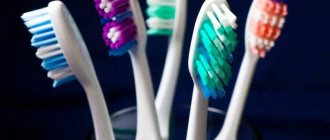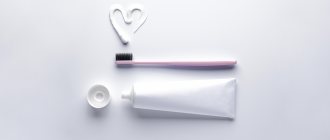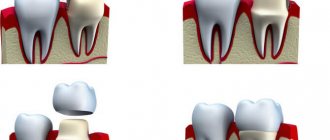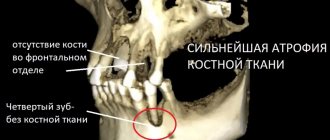Content:
- Why is there a need to strengthen enamel?
- Signs in the presence of which you need to think about strengthening
- Products that can help improve the situation
- Dentist advice
- Strengthening techniques used in dentistry
- Pastes and gels
Tooth enamel is one of the hardest tissues of the human body.
But, despite its strength, over the years it gradually collapses and becomes thinner. Then a completely logical question arises: how to strengthen teeth in order to avoid serious dental problems. Violation of the natural structure of the enamel layers is facilitated by eating too hot and very cold foods, smoking, and a love of sweets. Oral health is also negatively affected by the fact that many people do not pay due attention to daily hygiene care. They ignore the need for an annual visit to the dental hygienist.
Why is there a need to strengthen enamel?
Caries is one of the most common problems that dentists have to deal with. It is because of its frequent occurrence that many people are forced to look for ways to strengthen their teeth. The disease is caused by:
- genetic predisposition to an abnormal process;
- disruptions in the functioning of the endocrine system;
- severe pathologies of the stomach and intestines;
- untimely removal of soft plaque and hard stone;
- non-compliance with dental cleaning techniques;
- refusal to eliminate non-carious enamel lesions;
- pathological abrasion;
- incorrect bite, due to which it is impossible to properly clean individual interdental areas;
- poor diet, habit of eating a lot of sour and sweet foods;
- alcohol abuse, tobacco addiction;
- habit of chewing foreign objects.
Often the enamel is greatly weakened due to hormonal changes. This is why many expectant mothers become patients in dental clinics.
Dental vitamins during pregnancy
Taking vitamins for pregnant women is a controversial issue. Doctors recommend starting to drink synthetic complexes no earlier than the second trimester.
What kind of calcium can you drink during pregnancy to promote the formation of healthy teeth in the fetus and not lose your teeth? In fact, you can take any calcium, always with vitamin D3 and K2, as well as with the other microelements listed above. The main thing to consider is the following points:
- Do not exceed dosage.
- Do not take the complex for more than 2 months in total and 2 weeks in a row.
Dentists even advise buying good vitamins even at the stage of pregnancy planning, since the formation of teeth in the fetus occurs in the first weeks. If the expectant mother has a good supply of necessary substances in her body, then the baby will not have problems with teeth.
Of course, it is better to purchase a vitamin-mineral complex as prescribed by a doctor, and not choose it based on reviews on the Internet.
Signs in the presence of which you need to think about strengthening
You should ask a qualified dentist how to strengthen your teeth if:
- the enamel has acquired an unsightly yellow or gray tint, which is why the smile begins to look less aesthetically pleasing than before;
- when eating sour, sweet, or spicy foods, sharp dental pain periodically appears;
- the coronal part has become transparent in the area of the cutting edge;
- pain occurs when biting and chewing hard foods;
- chips and cracks appeared;
- rapidly progressing caries developed.
In all these cases, you need to make an appointment with a dentist as soon as possible. The doctor will conduct a simple diagnosis and determine what caused the problem, and select medications that will improve the condition of the enamel.
Products that can help improve the situation
In the human body, a lot depends on nutrition. It is impossible to have a healthy smile if you consume a huge amount of junk food every day. If a person wants to make his enamel resistant to the negative influences of external irritants, he should eat a lot of fresh fruits and vegetables. Also useful:
- Seafood. They are a quality source of phosphorus.
- Fermented milk and dairy products containing calcium.
- Kiwi. This fruit is a real storehouse of ascorbic acid. At the same time, unlike oranges, tangerines and lemons rich in this vitamin, it does not irritate the enamel.
- Greenery. Source of a huge amount of vitamins and microelements. You definitely need to eat it. If a person does not like greens, they should treat them as natural medicine and still use them in their cooking on a regular basis.
- Honey. Beekeepers call it a natural antiseptic. It perfectly relieves inflammation and promotes rapid healing of gum disease.
To strengthen your teeth, it is very important to stop drinking any sweet carbonated drinks, smoking, and alcohol. It is also not recommended to frequently chew nuts and seeds or smoke.
What vitamins should I take for dental health?
The table of vitamins contains substances that are synthesized in our body in sufficient quantities, and there are those in which a person is deficient. Especially at certain stages of life. For example, women over 50 need additional vitamin E capsules, and in winter almost everyone requires increased doses of vitamin D.
Almost the entire spectrum of vitamins is necessary for dental health, however, some of them play a leading role in calcium metabolism. And calcium, as we have already found out, is the basis of dentin and enamel.
Vitamin D3
The main driver of calcium metabolism is vitamin D.
By the name vitamin D we mean a complex of active substances. Cholecalciferol (vitamin D3) is formed in the body under the influence of sunlight, and ergocalciferol (vitamin D2) can only be obtained from food. Many people are interested in which one is better to buy – water-soluble D2 or fat-soluble D3? In fact, both of them equally contribute to the absorption of calcium by the body, so you can choose either one and take it according to the instructions.
Many doctors recommend getting tested for vitamin D before you start taking it in tablets. This makes sense, since fat-soluble vitamins can accumulate in the body and cause various diseases.
The minimum daily dose for adults and children is 400 units.
Vitamin C, ascorbic acid
Ascorbic acid takes part in the synthesis of collagen, which is part of dentin. Collagen provides tissue strength. Without it, teeth would be fragile and brittle.
If we talk about which vitamins you can drink in large doses, then ascorbic acid is one of them. The minimum daily dose of vitamin C is 60 mg, however, sometimes it is advisable to increase it to 1000 mg. Ascorbic acid does not accumulate in the body, but is immediately excreted in the urine.
Vitamin K
The trivial name vitamin K combines vitamin K1 (phylloquinone) and K2 (menaquinone). The first of them is found in some plant foods, and the second is synthesized in our intestines with the participation of fats. In pharmacies you can usually buy only phylloquinone, while scientists have found that it is less active than its counterpart.
The daily dose of vitamin K2 is approximately 80 mg. It simply needs to be taken along with calcium for the normal condition of the enamel. Menaquinone is needed to form the correct spatial lattice of an organic molecule containing calcium.
Vitamin B complex
Vitamins B1, B6, B12 and others, although not directly involved in the synthesis of dentin and enamel, help maintain normal metabolism in general.
Daily doses of B vitamins in tablets are:
- Vitamin B1 – 1.5 mg.
- Vitamin B2 – 1.7 mg.
- Vitamin B3 – 20 mg.
- Vitamin B5 – 10 mg.
- Vitamin B6 – 2 mg.
- Vitamin B12 – 6 mcg.
Dentist advice
Doctors emphasize that you need to carefully take care of your oral health and brush your teeth in a timely manner. A high level of hygiene is the basis without which nothing can be achieved at all. If plaque is not removed in a timely manner, thinned enamel, loosening of the molar units, hyperesthesia, and gingivitis will not take long to occur.
At the same time, it is not enough to just brush your teeth in the morning and evening - you need to do it correctly. During the procedure, you should use a high-quality brush and paste (it’s good if your dentist selects them).
To the aid of sensitive and caries-prone units come:
- rinses with anti-inflammatory activity;
- strengthening gels;
- floss;
- professional hygiene.
Professional oral hygiene
Due to his age, a child, no matter how well his parents teach him to care for his oral cavity, does not do it well enough, so plaque accumulates on the enamel. And under such conditions, the probability of developing caries on baby teeth is almost one hundred percent. This means that the child also needs additional professional care, that is, comprehensive teeth cleaning, which will be the best prevention of caries and inflammation of periodontal tissue.
We recommend carrying out comprehensive hygiene 2-3 times a year, not only to prevent caries, but also to familiarize the child with the work of a doctor, instruments and the dental office - he will be less afraid and when treatment is required, the process will be much easier. It can be carried out from the moment the child’s primary teeth have fully grown.
What is the difference between a pediatric procedure and an adult one? Children do not use abrasive compounds, i.e. Air Flow device is not used. Cleaning fragile enamel is carried out as carefully as possible:
- Using a brush and polishing paste, the doctor cleans all hard-to-reach areas,
- sometimes an ultrasonic scaler is used to remove solid deposits (if necessary),
- The enamel is coated with a protective remineralizing fluoride varnish.
Strengthening techniques used in dentistry
Experienced dentists use highly concentrated products enriched with minerals when working with “problem” teeth. Additionally, they prescribe fluoride-containing pastes and remineralizing gels to patients, which can be used at home.
This is the name of the most effective dental procedures to strengthen teeth:
- Remineralization. First, professional hygiene is carried out. Using an ultrasonic scaler, the doctor cleans the crowns of deposits. After this, it covers them with a special remineralizing composition. Prepared enamel absorbs beneficial components like a sponge. Due to this, her condition improves. It becomes dense, very hard and perfectly smooth. In advanced cases, one remineralization session may not be enough. Then it is repeated two to four times at certain intervals.
- Fluoridation. Often this type of treatment is combined with remineralization. This is due to the fact that fluoride is better absorbed after calcium. Fluoridation means the treatment of hard dental tissues with a fluoride-containing preparation. It quickly penetrates into the deep layers of the tooth and saturates its tissues, making them more resistant to negative external factors. It is especially important to undergo fluoridation twice a year for people who live in regions where the water flowing from the taps is low in fluoride compounds.
Pastes and gels
At home, a person can strengthen enamel by using high-quality dental pastes and gels. Particularly valuable are compositions that include the following components:
- Fluorine. It is better absorbed when presented in the form of sodium fluoride or amino fluoride. Passing through the outer layers of enamel, these components react with hydroxyapatite, the main substance that makes up the upper shell of the tooth. As a result, a strong connection is formed that is not susceptible to the negative effects of bacteria and acids that cause caries. On an ongoing basis, a person can use products containing 1000 ppm of fluoride. If the doctor has prescribed a treatment course for weakened enamel, this indicator can be increased to 1500 ppm. In this case, the drug will also exhibit remineralizing properties. But it is suitable only for course use. If the packaging says that fluoride contains more than 1000 ppm, you should not use the product without consulting a doctor. Such amateur activities often result in fluorosis, a very unpleasant dental disease associated with an excess of fluoride in the body.
- Hydroxyapatite. An excellent remineralizing component. Helps to qualitatively strengthen dental tissues at home. It quickly integrates into the crystal lattice of hard tissues. Even eliminates caries at the spot stage. The compound fills all the small cracks and makes the crown part absolutely smooth, resistant to the destructive effects of bacteria and microbes.
- Amorphous calcium phosphate, glycerophosphate. These substances have the unique ability to form a kind of protective film on the surface being treated. It strengthens the enamel and protects the unit from the destructive influence of harmful factors. It is important to know that these two components are contraindicated for people who are allergic to milk protein.
Natural plant extracts. There are a lot of pastes with plant extracts on sale. Natural ingredients such as propolis, chamomile, sage, lavender, yarrow, and oak bark have proven themselves to be excellent. Of course, they are not as effective as the above-mentioned chemical components. But they have a good effect on the condition of the gums, relieve increased bleeding and provide reliable prevention of gingivitis.
If you are looking for something to strengthen your teeth, then start with professional hygiene. This procedure will prepare the dentition for further activities. Immediately after hygiene, ask your doctor what products he will recommend for you. This approach to therapy is the most effective and completely safe.
Fissure sealing
Teeth that are not affected by caries and have softened enamel are coated with a protective sealant that contains fluoride. The composition is slightly softer than a filling; it is used to fill fissures (small depressions on the chewing surface of the teeth), after which they are illuminated with a halogen lamp, under the influence of which the sealant hardens. So it reliably protects teeth from caries and damage for 2-3 years. The procedure takes no more than half an hour. It is recommended for those children who have very large grooves on their teeth, otherwise bacteria will accumulate in them, which will lead to caries.










